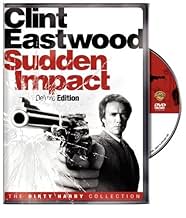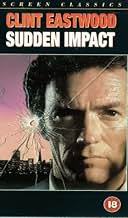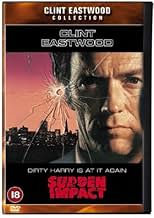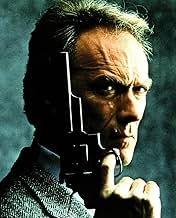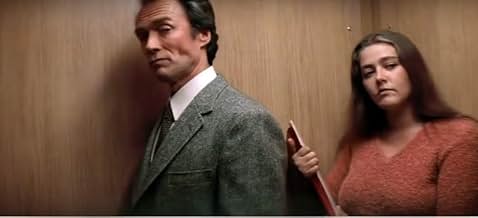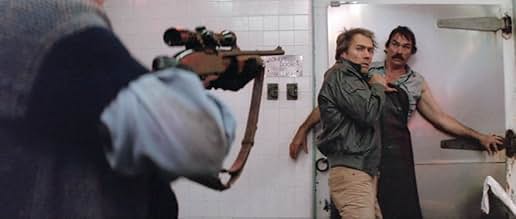IMDb-BEWERTUNG
6,6/10
50.848
IHRE BEWERTUNG
Ein Vergewaltigungsopfer mittleren Alters übt in einer Kleinstadt außerhalb von San Francisco Rache an ihren Angreifern. Der "schmutzige" Harry Callahan weil er seine Vorgesetzten verärgert ... Alles lesenEin Vergewaltigungsopfer mittleren Alters übt in einer Kleinstadt außerhalb von San Francisco Rache an ihren Angreifern. Der "schmutzige" Harry Callahan weil er seine Vorgesetzten verärgert hatte, wird dem Fall zugewiesen.Ein Vergewaltigungsopfer mittleren Alters übt in einer Kleinstadt außerhalb von San Francisco Rache an ihren Angreifern. Der "schmutzige" Harry Callahan weil er seine Vorgesetzten verärgert hatte, wird dem Fall zugewiesen.
- Auszeichnungen
- 3 Nominierungen insgesamt
Audrie Neenan
- Ray Parkins
- (as Audrie J. Neenan)
Empfohlene Bewertungen
The Dirty Harry series are great films. Forget reality and political correctness, just enjoy the films. Like the rest of the series the formula is perfect in Sudden Impact, a great actor delivering action, humour, thrills and excitement.
Sudden Impact was the fourth instalment in the 'Dirty Harry' series and the only one in which Clint Eastwood not only starred in but directed as well. This time, Harry Callahan is sent up the coast by his superiors to investigate a series of murders that are connected to a small ocean side resort town.
I reckon this may well be the third best entry in the series after the peerless first instalment and its follow-up Magnum Force (1973). Unlike the other two in the series, this one has a more interesting plot-line which involves a vigilante killer played by Eastwood regular actress Sandra Locke. She almost shares top-billing with him here such is the prominence of her role. She plays by far the most sympathetic villain in the series, one who dispatches a series of truly vile characters who assaulted her and her now comatose sister ten years previously. It's the very fact that the role has been written with a lot more depth that contributes to the audience empathising with her, while still knowing that she is committing a series of murders. This dramatic tension is underpinned by the theme of how ineffective and corrupt the justice system can be, leading to victims taking the law into their own hands.
This is probably the entry in the series that most veers into psychological thriller territory and I think this change does work in its favour. However, its bread and butter is still action and it hardly falls short on that score. There is an ongoing plot thread which has Callahan continually targeted by Mob hit-men who want him dead for an earlier infraction he instigated against one of their big bosses. Not only this but he also has high adrenaline encounters with three other sets of different criminals. It could be argued, however, that in its latter stages the film went too much in the direction of having villains acting like half-wits allowing for Callahan to escape their clutches and return to defeat them, while the finale in the fun-park felt a little too simplistically cheesy. But, these small gripes aside, I thought this to be a pretty fine effort for a fourth instalment in a film series and a pretty good film in its own right overall.
I reckon this may well be the third best entry in the series after the peerless first instalment and its follow-up Magnum Force (1973). Unlike the other two in the series, this one has a more interesting plot-line which involves a vigilante killer played by Eastwood regular actress Sandra Locke. She almost shares top-billing with him here such is the prominence of her role. She plays by far the most sympathetic villain in the series, one who dispatches a series of truly vile characters who assaulted her and her now comatose sister ten years previously. It's the very fact that the role has been written with a lot more depth that contributes to the audience empathising with her, while still knowing that she is committing a series of murders. This dramatic tension is underpinned by the theme of how ineffective and corrupt the justice system can be, leading to victims taking the law into their own hands.
This is probably the entry in the series that most veers into psychological thriller territory and I think this change does work in its favour. However, its bread and butter is still action and it hardly falls short on that score. There is an ongoing plot thread which has Callahan continually targeted by Mob hit-men who want him dead for an earlier infraction he instigated against one of their big bosses. Not only this but he also has high adrenaline encounters with three other sets of different criminals. It could be argued, however, that in its latter stages the film went too much in the direction of having villains acting like half-wits allowing for Callahan to escape their clutches and return to defeat them, while the finale in the fun-park felt a little too simplistically cheesy. But, these small gripes aside, I thought this to be a pretty fine effort for a fourth instalment in a film series and a pretty good film in its own right overall.
It's at this point that the 'Dirty Harry' series really starts to blend into itself, with set-pieces from one entry easily being mistaken for those in another. The overall stories still distinguish themselves, though. 'Sudden Impact (1983)' is perhaps the least conventional in the franchise, at least in terms of how it relates to the first in its series, as it follows both Eastwood's disgruntled detective and the serial killer he's chasing in, essentially, equal measure. It's at its most interesting when it explores themes of justice, revenge and how the system can sometimes fail. Unfortunately, it sort of goes back on Harry's character in the process, ending on a decision that would have made his skin crawl in any other feature. It's not a huge issue, but it is noticeable. So is the generally less entertaining nature of the flick, which doesn't feel quite as confident as any of the others in its franchise. It's entertaining enough, don't get me wrong. In fact, it's usually enjoyable. It's just that it has stretches that are almost dull and, as a whole, isn't as compelling as it could have been. It's a good film, just not a great one. 6/10
Sudden Impact is the most unusual of the five Dirty Harry movies, but that doesn't make it the best. However, after the rather flat and comic-book heroics of the third film, The Enforcer, it's good to see some changes to the formula. Sudden Impact is quite a dark, moody piece of cinema with big emphasis on character. Yes, there's action, but the action in this one is only one piece of the jigsaw whereas in some of the other Dirty Harry outings the action was everything.
Harry Callahan (Eastwood) is in hot water with his superiors for carrying out an illegal search on a suspicious car. The young thugs he arrested are released because of the lack of evidence, and they set out to take revenge on Harry. However, Harry is a tough nut to crack - and pretty soon he is striking back in his own destructive style. Harry's boss decides to get Harry out of town for a while to avoid further bloodshed, so he assigns him to a quiet murder investigation in an isolated coastal town. Harry pieces together the mystery and discovers that the killer is a female artist (Locke) who is bumping off a bunch of drop-outs who gang-raped her and her sister years previously. Should he arrest her for the killings, or should he turn a blind eye and let her do away with these repellent scum-bags?
The film is probably the second best in the series (the original is always going to be considered the best). Peculiarly, it is the only Dirty Harry movie upon which Eastwood also doubled up as director. It isn't a whole success, with some needless scenes (what's the point of the sequence detailing the hold-up of a coffee shop?) and a couple of overly hammy performances by the main villains (especially the trailer trash redhead). On the whole, though, this is a very interesting and unusual addition to the series which gets by on the strength of being totally different to all the other four episodes.
Harry Callahan (Eastwood) is in hot water with his superiors for carrying out an illegal search on a suspicious car. The young thugs he arrested are released because of the lack of evidence, and they set out to take revenge on Harry. However, Harry is a tough nut to crack - and pretty soon he is striking back in his own destructive style. Harry's boss decides to get Harry out of town for a while to avoid further bloodshed, so he assigns him to a quiet murder investigation in an isolated coastal town. Harry pieces together the mystery and discovers that the killer is a female artist (Locke) who is bumping off a bunch of drop-outs who gang-raped her and her sister years previously. Should he arrest her for the killings, or should he turn a blind eye and let her do away with these repellent scum-bags?
The film is probably the second best in the series (the original is always going to be considered the best). Peculiarly, it is the only Dirty Harry movie upon which Eastwood also doubled up as director. It isn't a whole success, with some needless scenes (what's the point of the sequence detailing the hold-up of a coffee shop?) and a couple of overly hammy performances by the main villains (especially the trailer trash redhead). On the whole, though, this is a very interesting and unusual addition to the series which gets by on the strength of being totally different to all the other four episodes.
It's a strange thing to see a film where some scenes work rather weakly (if only in comparison to other films in its legacy), and others in a 'sub-plot' or supporting story are surprisingly provocative and strong. Sudden Impact is one of those cases, where Clint Eastwood as star/producer/director shows when he can be at his best, or at his lessor of times when dealing with a crime/mystery/detective story in his Dirty Harry fame. We get that 'make my day' line, and un-like in the first film where his 'do I feel lucky' speech was playful and cool the first time and the second time at the end tough as nails, here it's switched around. He gets into another shamble with the department, as usual, when he tries to fight crime 'his' way, in particular with a diner robbery (inspiration for Pulp Fiction?) and with a high speed pursuit with a senior citizen bus. He's told to 'take a vacation', and that's the last thing on his mind. This whole main plot isn't very convincing aside from the expectancy of the story and lines, which just adds to the frustration. But soon his story merges with the sub-plot that Eastwood develops from the start.
Enter Sandra Locke's character, Jennifer Spencer, whom we soon learn after some (appropriately) mysterious scenes that she and her shy sister were victims of a cruel, unjust sexual assault (err, outright rape), and is sleekly, undercover-like, getting revenge. Her scenes and story are the strongest parts of the film, the most intense, and finally when it goes into Callahan's storyline (he's getting facts in the same small town she's in on a murder), the film finally finds a focus between Eastwood's classic form of clearly defined good vs. evil (though sometimes blurred, to be sure). Eastwood films the flashbacks, not to say too much about them, expertly, in a fresh, experimental style; the trademark Lalo Schifrin score is totally atmospheric in these scenes and in others. It almost seems like a couple of times an art-house sensibility has crept into Eastwood's firmly straightforward storytelling style, which helps make the film watchable.
It's a shame, though, that in the end it goes more for the expectable (or maybe not expectable) points, and until the third act Callahan doesn't have much to do except his usual 'it's smith...Wesson...and me' shtick. However, with Locke he gets out of her a very good performance (more subtle and touching than the one in the Gauntlet) and an exciting climax at an amusement park. In a way I do and don't agree with Ebert's remark that it's like a 'music video' in Eastwood's style here. I admit there is comparisons with the simplicity of both, the directness, but the scenes where Eastwood does break form are superior to those of any music video. It's cheesy, it's hard-edged, it's not up to par with the first two 'Harry' pictures, but hey, there could be worse ways to spend a couple hours with the master of the .44.
Enter Sandra Locke's character, Jennifer Spencer, whom we soon learn after some (appropriately) mysterious scenes that she and her shy sister were victims of a cruel, unjust sexual assault (err, outright rape), and is sleekly, undercover-like, getting revenge. Her scenes and story are the strongest parts of the film, the most intense, and finally when it goes into Callahan's storyline (he's getting facts in the same small town she's in on a murder), the film finally finds a focus between Eastwood's classic form of clearly defined good vs. evil (though sometimes blurred, to be sure). Eastwood films the flashbacks, not to say too much about them, expertly, in a fresh, experimental style; the trademark Lalo Schifrin score is totally atmospheric in these scenes and in others. It almost seems like a couple of times an art-house sensibility has crept into Eastwood's firmly straightforward storytelling style, which helps make the film watchable.
It's a shame, though, that in the end it goes more for the expectable (or maybe not expectable) points, and until the third act Callahan doesn't have much to do except his usual 'it's smith...Wesson...and me' shtick. However, with Locke he gets out of her a very good performance (more subtle and touching than the one in the Gauntlet) and an exciting climax at an amusement park. In a way I do and don't agree with Ebert's remark that it's like a 'music video' in Eastwood's style here. I admit there is comparisons with the simplicity of both, the directness, but the scenes where Eastwood does break form are superior to those of any music video. It's cheesy, it's hard-edged, it's not up to par with the first two 'Harry' pictures, but hey, there could be worse ways to spend a couple hours with the master of the .44.
Wusstest du schon
- WissenswertesCharles B. Pierce wrote the line "Go ahead, make my day." The line was inspired by a warning that his father would say to Pierce when he was a child. According to Pierce, his father warned him "When I come home tonight and the yard has not been mowed, you're gonna make my day."
- PatzerAs Horace exits the car while visiting Harry, who is about to begin target shooting in the woods, one of the Panavision cameras is clearly visible, reflected in the car window, as well as Eastwood's son, who was visiting the set.
- Zitate
[Callahan dares a crook to shoot his hostage]
Harry Callahan: Go ahead, make my day.
- Alternative VersionenJust like with the previous movies, the 5.1 DVD/Blu-ray remix replaces a bunch of sound effects (mostly gunshots) with more modern ones. However, in addition to that right before the carnival shootout at the end, originally when Harry was approaching the villains, the music had a very loud screeching sound, but the remix completely removes it. (but remains intact on the soundtrack and foreign mono tracks)
- VerbindungenFeatured in At the Movies: Christine/Silkwood/Sudden Impact/Thriller (1983)
- SoundtracksTHIS SIDE OF FOREVER
Performed by Roberta Flack
Music by Lalo Schifrin
Lyrics by DeWayne Blackwell (as Dewayne Blackwell)
Top-Auswahl
Melde dich zum Bewerten an und greife auf die Watchlist für personalisierte Empfehlungen zu.
Details
Box Office
- Budget
- 22.000.000 $ (geschätzt)
- Bruttoertrag in den USA und Kanada
- 67.642.693 $
- Eröffnungswochenende in den USA und in Kanada
- 9.688.561 $
- 11. Dez. 1983
- Weltweiter Bruttoertrag
- 67.642.693 $
Zu dieser Seite beitragen
Bearbeitung vorschlagen oder fehlenden Inhalt hinzufügen

Oberste Lücke
By what name was Dirty Harry IV - Dirty Harry kommt zurück (1983) officially released in India in English?
Antwort

